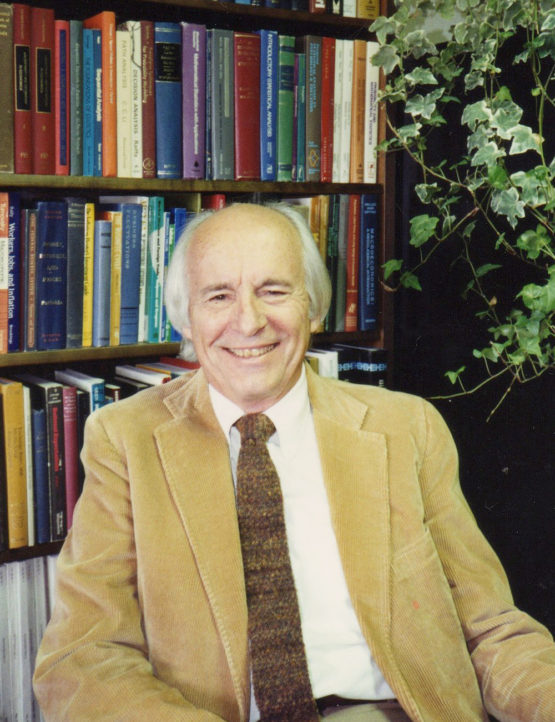Stanford economist Bert George Hickman, Jr. dies at 95
Hickman was known for his work as an empirical macroeconomist, an educator and economic forecaster.
Bert George Hickman, Jr., a professor of economics, emeritus, at Stanford University, died Nov. 23, 2019, at the age of 95. He was known for his work as an empirical macroeconomist, as an educator and as an economic forecaster.
Hickman first joined Stanford in 1949 where he served as an instructor in the Economics Department until 1951. He returned to Stanford in 1966 as a tenured professor after stints at the National Bureau of Economic Research, Northwestern University, the Council of Economic Advisors and the Brookings Institution.
Upon his return, Hickman met Robert Coen, then an assistant professor in the Economics Department, who would become a collaborator and colleague. Their research partnership would last through the rest of their careers, even after Coen left Stanford to join the faculty at Northwestern in 1971.
“Our long scientific collaboration was sustained by our mutual interest in economic issues and by a shared enthusiasm for new tools of econometrics and computer simulation methods in economics,” Coen said. “Looking back, it was 50 years of very satisfying intellectual accomplishment, a matchless personal friendship and a lot of fun.”
Hickman and Coen were pioneers in econometric modeling techniques and would program their algorithms on punch cards to run on Stanford’s IBM 360/67 mainframe computer, which was quite powerful for the time. They developed the Hickman-Coen Annual Model, which predicts the growth and stability of the U.S. economy over 10- and 20-year periods. The model is a system of statistical equations that accounts for the movements of employment, income, consumer and investment spending, prices, wages, interest rates and other variables. Among its many applications, the model has been used to study the causes of the Great Depression, explain why the economy was more stable after World War II than before, and the impacts of energy price changes on growth, employment and inflation.
Hickman was also known for his work in international macroeconomics. He collaborated with Lawrence Lau, the Kwoh-Ting Li Professor in Economic Development, emeritus, at Stanford and a professor of economics at the Chinese University of Hong Kong. Together, Hickman and Lau constructed econometric models of multilateral trade flows of the world and the Pacific Basin.
“Bert was a very rigorous economist and had the highest standards of theoretical specification and empirical practice in his research,” Lau said. “Bert was an exemplary scholar.”
Committed to his students
Hickman was also deeply committed to his students, and he stood up for their interests in department decision-making, recalled his colleagues John Shoven and Gavin Wright in a letter to the Stanford economics community.
During his tenure at Stanford, Hickman chaired the department from 1975 to 1978, served as the department’s director of undergraduate studies, and taught several popular courses.
In 1968, Hickman and Nobel laureate Lawrence Klein initiated Project LINK, a cooperative international research activity at the Social Science Research Council of the United States to better understand ways to integrate macro models developed in advanced economies around the globe. Hickman served as chairman of the executive committee for the project for nearly 30 years.
Hickman’s publications include An Annual Growth Model of the U.S. Economy (1976) that he co-authored with Coen. He also edited volumes such as Global International Economic Models (1983), Macroeconomic Impacts of Energy Shocks (1987), International Productivity and Competitiveness (1992). In 1984 he edited International Monetary Stabilization and the Foreign Debt Problem for the Federal Reserve Bank of San Francisco.
Early life and career
Hickman was born Oct. 6, 1924, in Los Angeles. He began his undergraduate studies at the University of Southern California from 1943-45 as part of the Navy’s V-12 program, a plan designed to produce more educated officers for the U.S. military. He earned his bachelor’s degree at the University of California, Berkeley, in 1947 and his doctorate in economics there in 1951.
Hickman served as a senior staff economist at the Council of Economic Advisers from 1954 to 1956. He also served as a consultant for various periods at the Federal Reserve Board, the National Science Foundation and the Ford Foundation.
But his heart was at the Farm, his son Paul recalled.
“He loved being at Stanford,” Paul Hickman said. “He loved the environment and he loved the school.”
According to his son, Hickman enjoyed taking the family to basketball and football games, and especially walking their beagle, Buffy, around campus.
Hickman is survived by his wife, Edythe, and three children, Wendy, Paul and Alison.
A celebration of Hickman’s life will be held Friday, Dec. 20, from 11:30 a.m. to 2 p.m. at the Stanford Faculty Club.

